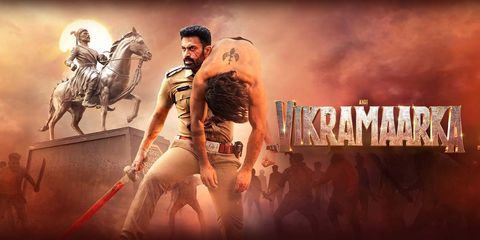Aho Vikramaarka Movie Filmy4wap:
Cast: Dev Gill, Chitra Shukla, Pravin Tarde, Tejaswini Pandit, Posani Murali Krishna, Bittiri Satti, Sayaji Shinde, Kalakeya Prabhakar, Vikram Sharma, and others
Director: Peta Trikoti
Producers: Aarti Devinder Gill, Meehir Kulkarni, Ashwini Kumar Misra
Music Director: Ravi Basrur
Cinematographers: Karam Chawla and Guru Prasad N
Editor: Tammiraju
Related Links: Trailer
Dev Gill, widely recognized for his roles as a villain, steps into the shoes of a protagonist in Aho Vikramaarka. The film has hit the theaters, and here’s our take on it.
Plot Summary:
Set in Pune, the story centers around the mysterious disappearance of men from Parvathy Slum after they are taken to a place called Dhandaka. The situation draws the attention of the corrupt SI Vikramarka (played by Dev Gill), who soon realizes that the area is under the control of Asura (Pravin Tarde). What path does Vikramarka choose—will he save the people or ally with Asura? And where does Archana (Chitra Shukla) fit into this tale? The film unravels these mysteries.
Positive Aspects:
Dev Gill, typically cast as an antagonist, surprises as the hero of this film. His physicality complements the hero’s role, and his performance, especially in the mass action scenes, is commendable. He also manages to convey the necessary emotions convincingly.
Chitra Shukla, the female lead, shares good on-screen chemistry with Dev Gill and performs her part satisfactorily. Pravin Tarde excels as the menacing villain, while Kalakeya Prabhakar, Tejaswini Pandit, and the rest of the cast deliver decent performances.
Ravi Basrur’s dynamic score significantly enhances the film, particularly elevating key moments like the interval fight scene, which stands out as a highlight.
Negative Aspects:
Despite some strengths, the film has its share of flaws. After a promising start, the narrative quickly falls into a predictable pattern. The entry scenes for the hero and heroine, along with a conventional love story and the familiar trope of brutal villains, offer little originality. These elements feel reminiscent of other films like KGF.
The characterization of the hero seems borrowed from films such as Temper and Pataas, resulting in a movie that feels like a patchwork of familiar mass cinema tropes. While the first half is somewhat engaging, the second half becomes increasingly tedious, filled with illogical sequences.
In an attempt to portray the hero as a larger-than-life figure, the film introduces unnecessary elements, compromising the natural flow of the story. The plot twists are often predictable, diminishing the overall excitement. The climax is underwhelming, and the songs fail to make an impact. The emotional scenes leading up to the climax come across as overly melodramatic.
Technical Aspects:
On the technical front, the film boasts solid production values, and the action sequences are well-executed. However, the songs are lackluster. Ravi Basrur’s music remains a strong point, adding a stylish flair to various scenes. While the cinematography is competent, the film could have benefited from more rigorous editing—particularly in the second half, where two songs could have been omitted.
Director Peta Trikoti delivers a film that struggles to rise above mediocrity. The choice of a conventional backdrop is compounded by a lack of innovation in the narrative approach. The film’s reliance on clichéd villain and hero portrayals, despite some well-executed mass scenes and action sequences, results in an overall weak execution.
Conclusion:
Overall, Aho Vikramaarka fails to impress, despite Dev Gill’s notable performance and the well-crafted action sequences that may appeal to mass audiences. The film’s lackluster story, coupled with a predictable screenplay and an unconvincing emotional arc, makes it a largely forgettable experience.
